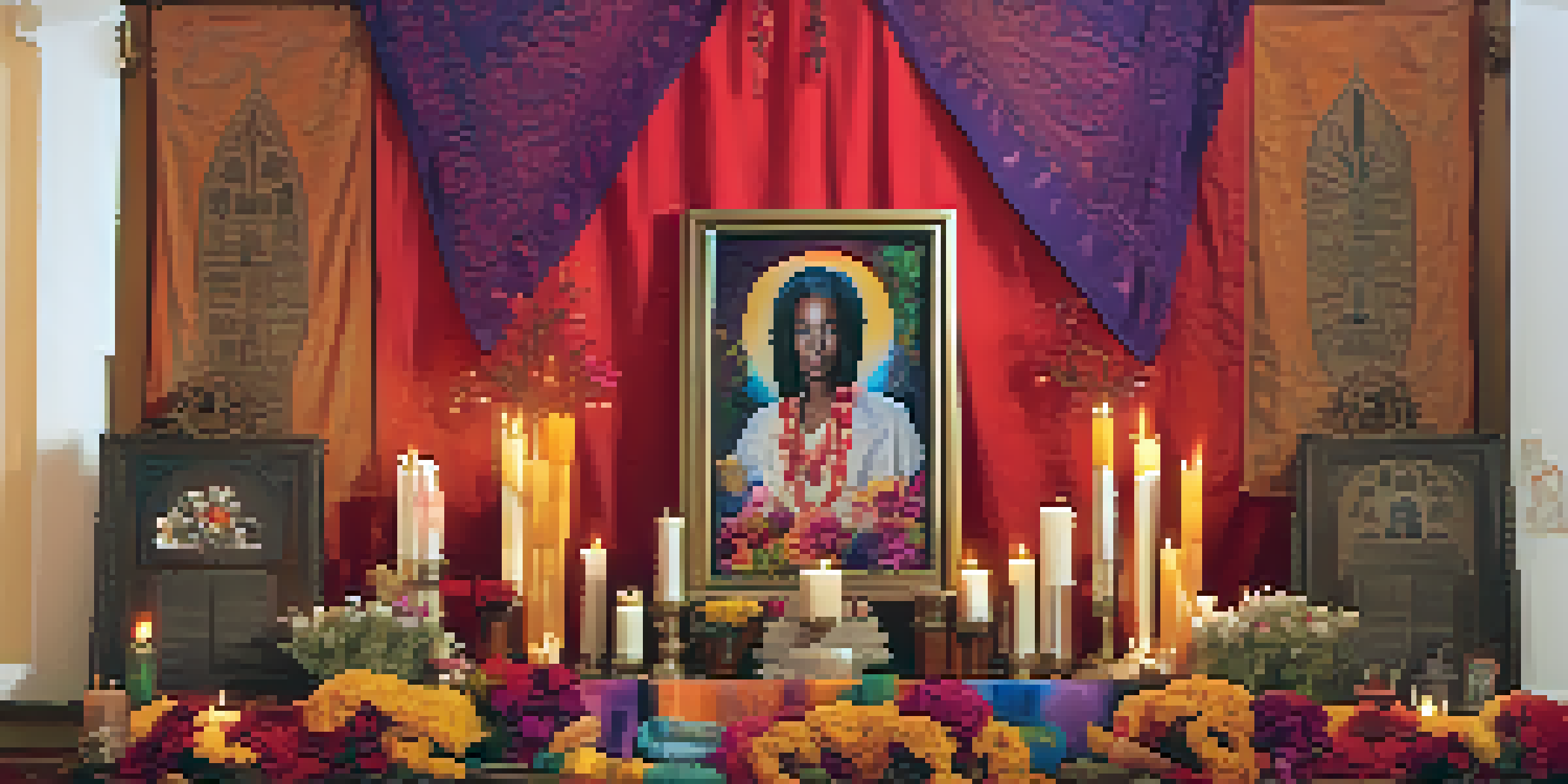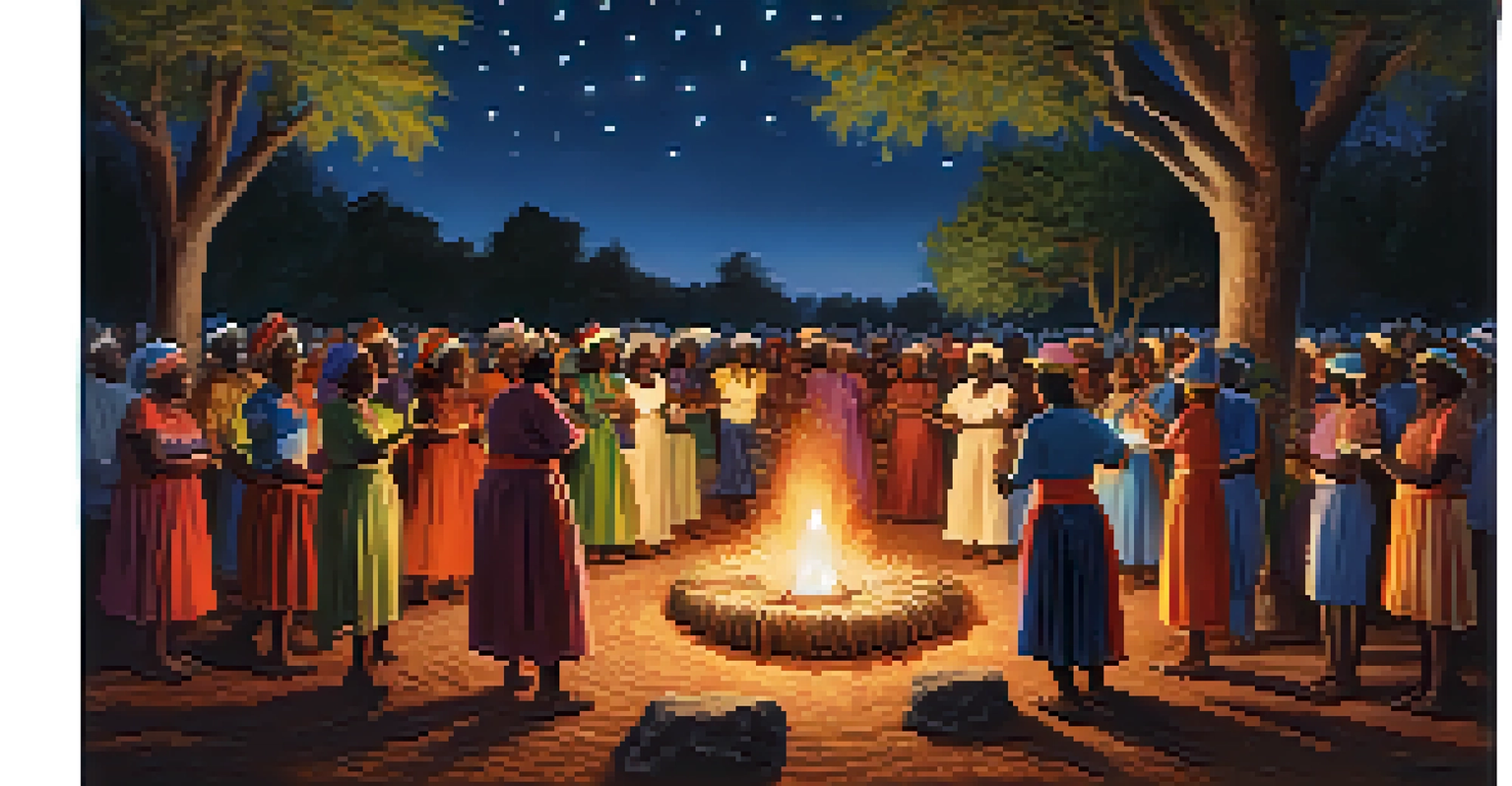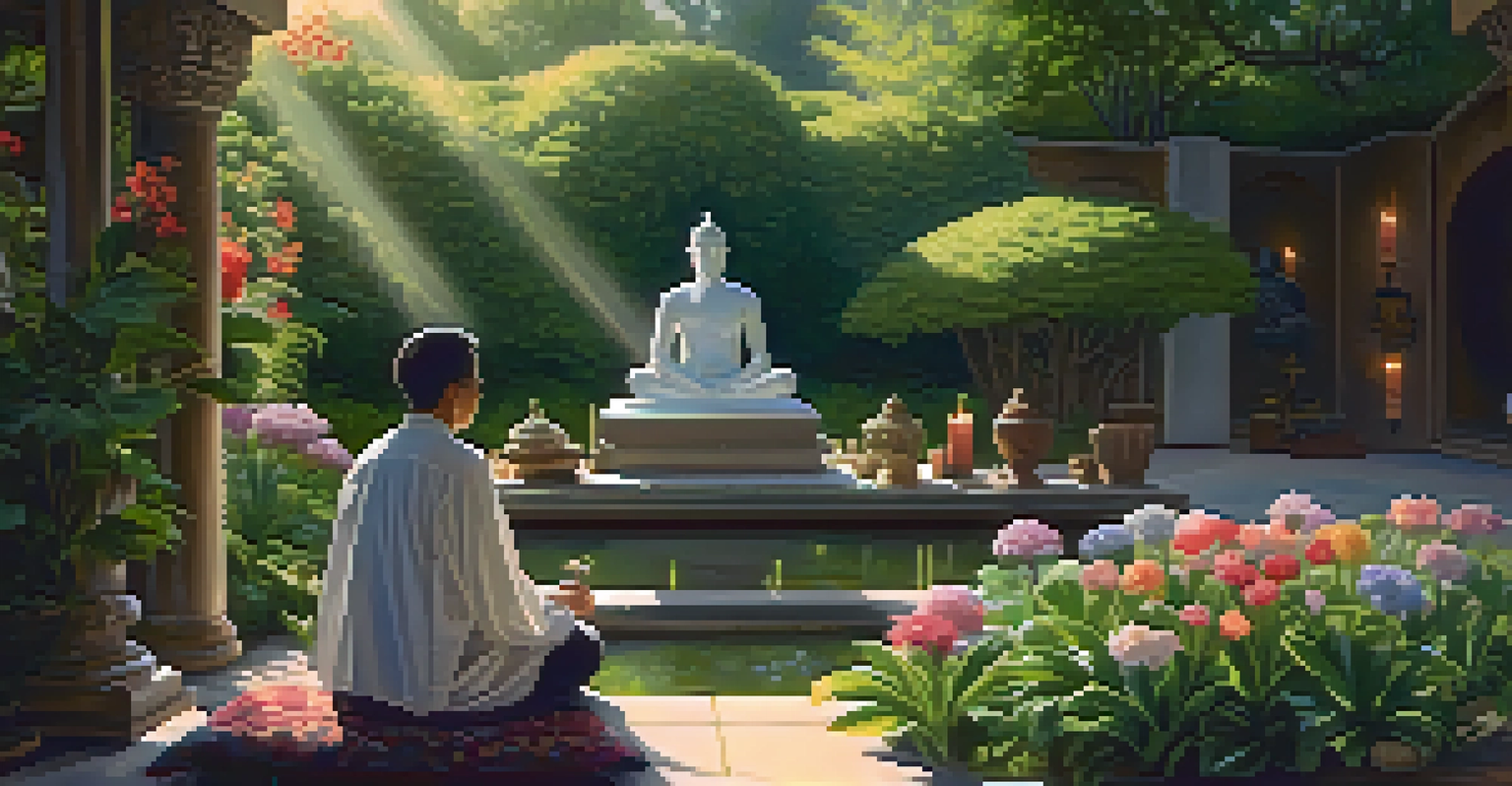The Role of Ancestors in Voodoo Spirituality and Rituals

The Importance of Ancestors in Voodoo Culture
In Voodoo spirituality, ancestors hold a sacred place, often seen as guides and protectors. They are revered not just as family members but as vital links to the spiritual realm. This connection fosters a sense of continuity, bridging the past with the present and shaping the identity of practitioners.
Our ancestors are always with us, guiding us in our daily lives, reminding us of the strength and wisdom that flows through our blood.
The honoring of ancestors is deeply embedded in Voodoo rituals, where practitioners often invoke their spirits for guidance. It’s not merely a cultural practice; it’s a profound acknowledgment of the wisdom and experiences that ancestors bring to the living. This reverence creates a strong communal bond that enhances the spiritual experience.
Through rituals and offerings, practitioners maintain a dialogue with their ancestors. This ongoing relationship is believed to provide strength, clarity, and protection, making ancestors integral to the Voodoo practice. By honoring them, practitioners affirm their roots and the rich history of their lineage.
Rituals: A Pathway to Connect with Ancestors
Rituals serve as a crucial avenue for practitioners to communicate with their ancestors. These ceremonies often involve singing, dancing, and the use of symbolic items that represent the spirits of the deceased. Each ritual is designed to invite ancestors into the space, creating an atmosphere charged with spiritual energy.

During these rituals, practitioners may call upon specific ancestors, asking for guidance or blessings. This process transforms the ritual into a personal experience, with each participant developing a unique connection to their family’s history. The act of invoking ancestors adds a layer of intimacy and personal significance to the practice.
Ancestors as Spiritual Guides
In Voodoo, ancestors are revered as essential guides and protectors, influencing practitioners' lives and decisions.
Additionally, offerings such as food, drink, and flowers are presented to ancestors during rituals. These gifts are seen as tokens of respect and love, reinforcing the belief that ancestors remain involved in the lives of their descendants. This reciprocity emphasizes the importance of maintaining a balanced relationship with the spirit world.
Ancestral Spirits: Guides in Daily Life
In Voodoo, ancestral spirits are often viewed as guides in everyday life, influencing decisions and actions. Practitioners may seek their ancestors' counsel when faced with challenges or important life choices. This guidance provides a comforting sense of support, fostering resilience and confidence.
To forget one's ancestors is to be a brook without a source, a tree without a root.
The presence of these spirits is felt in various aspects of life, from personal relationships to community well-being. By turning to their ancestors for advice, practitioners can draw on the collective wisdom of their lineage. This connection is not just spiritual; it’s a way to honor family traditions and values.
Moreover, the influence of ancestral spirits extends into the realm of healing. Many rituals focus on health and protection, invoking ancestors for their nurturing qualities. This belief in ancestral guidance helps practitioners navigate life's complexities with a sense of assurance and continuity.
Ancestral Altars: Sacred Spaces for Connection
Ancestral altars are central to Voodoo practice, serving as physical manifestations of the connection to the spirit world. These sacred spaces are often adorned with photographs, candles, and offerings, creating a focal point for prayer and reflection. Altars not only honor ancestors but also invite their presence into the home.
Creating an ancestral altar is a deeply personal process, reflecting the unique history and beliefs of each practitioner. It becomes a space where individuals can commune with their ancestors, share their thoughts, and seek guidance. This ritual of remembrance fosters a sense of belonging and continuity.
Rituals Foster Ancestral Connections
Rituals in Voodoo create intimate spaces for practitioners to communicate with their ancestors, reinforcing familial bonds.
Additionally, maintaining an altar requires ongoing care and devotion. Regular offerings and prayers reinforce the relationship between the living and the dead. This practice not only honors the ancestors but also serves as a reminder of the values and lessons they imparted.
The Role of Ancestors in Community Rituals
In Voodoo communities, ancestors play a vital role in collective rituals, strengthening communal bonds. These gatherings often involve storytelling, music, and dance, celebrating the legacy of those who have passed. Such events create a shared sense of identity and purpose among participants.
During community rituals, the collective invocation of ancestral spirits fosters a powerful spiritual atmosphere. Participants come together to honor their shared heritage, reinforcing their connections to one another and their ancestors. This unity enhances the overall experience, emphasizing the importance of community in Voodoo practice.
Moreover, these rituals serve as opportunities for teaching and learning about ancestral histories. Elders often share stories of their forebears, passing down wisdom and traditions to younger generations. This transmission of knowledge ensures that the legacy of ancestors continues to thrive within the community.
Understanding Ancestral Guidance in Decision Making
Many Voodoo practitioners lean on their ancestors for guidance when making important life decisions. This practice is rooted in the belief that the experiences of the past can illuminate the path forward. By consulting with their ancestors, individuals seek wisdom that transcends their personal experiences.
This process often involves reflection, prayer, and sometimes divination practices, which help clarify the messages from the ancestors. Whether through dreams, signs, or intuitive feelings, practitioners believe that ancestral spirits provide crucial insights. This connection transforms decision-making into a spiritual practice, imbued with significance.
Community Strengthened by Ancestors
Collective rituals celebrating ancestors enhance community ties and facilitate the sharing of traditions and wisdom among generations.
Furthermore, these ancestral consultations encourage individuals to consider their actions within the broader context of their family’s history. By reflecting on the lessons learned from ancestors, practitioners can make more informed choices that honor their lineage. This interconnectedness fosters a sense of responsibility and purpose.
The Legacy of Ancestors in Modern Voodoo Practice
As Voodoo continues to evolve, the role of ancestors remains a cornerstone of the practice. Modern practitioners adapt traditional rituals to fit contemporary life while maintaining a strong connection to their ancestry. This dynamic relationship ensures that the spiritual wisdom of ancestors is preserved and celebrated.
The integration of technology, globalization, and changing social dynamics has influenced how ancestral connections are practiced. Many individuals now share their rituals and experiences online, creating a global community that honors ancestral ties. This exchange of ideas enriches the practice and fosters a sense of belonging beyond geographical boundaries.

Ultimately, the legacy of ancestors in Voodoo serves as a reminder of the importance of remembering where we come from. It encourages practitioners to honor their past while navigating the complexities of modern life. By weaving ancestral wisdom into contemporary practice, Voodoo spirituality remains vibrant and relevant.